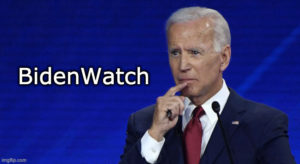Black voters have about the same enthusiasm for Biden as they do for leftover tuna casserole, his non-profit did more to line staffer’s pockets than fight cancer, and Biden agrees to three debates with Trump. It’s this week’s BidenWatch!

If what I heard Sunday in southeast Michigan is at all representative of the Black community across America, Democrats should be disturbed and afraid. Not because they risk losing an election, but because they risk losing the loyalty of an entire class of voters.
“Here’s the thing about Black people,” TONYA GRIFFITH said between sips of rose-colored liquid from a clear plastic cup. “We are real passive politically—until they give us a reason not to be. And trust me, we’re not feeling real passive right now.”
Three weeks ago, Griffith said, that wasn’t the case. Black voters she knows were coasting on autopilot during this election year. There was no feeling of intensity. And then came the killing of George Floyd. “That lit a fire under our ass like nothing I’ve ever seen,” Griffith said.
But how long will that fire burn? Griffith is skeptical. A 55-year-old clinical therapist, she was born and raised in Detroit. She had to work hard to make it—but she knows plenty of folks who didn’t make it. She was drilled by her parents on basic civic obligations—but she knows plenty of folks who weren’t. Griffith will vote this November. But she isn’t excited about it. And truth be told, she doesn’t know anyone who is.
“I bet our numbers come up, because nobody liked Hillary Clinton, but I don’t think they come up much. And I know they don’t get back to those record numbers from Obama,” Griffith said of Black voter turnout. “We look at Joe Biden and see more of the same. It’s about the era he came up. It’s about his identity—he’s a rich, old white man. What are his credentials to us, other than Obama picking him? It’s nice that he worked with Obama. But let’s keep it real: That was a political calculation. Obama thought he needed a white man to get elected, just like Biden thinks he needs a Black woman to get elected. We can see through that.”
These sentiments resurfaced in almost every conversation I had. First, that Biden choosing a woman of color might actually irritate, not appease, Black voters. Second, that the inferno of June would flicker by summer’s end and fade entirely by November. And third, that Biden does little to inspire a wary Black electorate that views him as the status quo personified. It was thoroughly convincing. Here were high-information voters, giving their personal opinions while also analyzing the feeling of their community, all making the same points in separate conversations.
We’re all Democrats, but we’re all Black Democrats. So, we can see things for what they are,” explained URSURA MOORE, a 53-year-old real estate agent. “Some people thought just because we had a Black president, he was going to make things better for Black people—he was going to free Black prisoners, wipe out Black debt. That was just ignorance. But the disappointment some of us felt with Obama—more so with the Democratic Party—that was real. And it hasn’t gone away. So, people start to wonder whether the outcome even matters. They wonder whether they should bother voting at all.”
She stopped herself. “I’m going to vote. But Trump’s getting back in office either way.”
This was another recurring theme of my conversations: a fatalism about defeating Trump this fall. Not a single person I spoke with at the cookout told me they believed Biden would win.
“There’s no excitement for Biden,” Moore said. “Trump can get his people riled up. Biden can’t. That’s why there’s all this talk of putting a Black woman on the ticket. But that’s not going to help him win.”
Read the whole thing.
Nearly two-thirds of the money the Biden Cancer Initiative spent since its founding in 2017 went toward staff compensation and six-figure salaries for top executives. The group spent far less on efforts to eradicate cancer.
One of several nonprofits Joe Biden created following his tenure in the White House, the Biden Cancer Initiative paid top executives lavishly, with salaries comprising nearly 65 percent of its total expenditures. That is well above the 25 percent charity watchdogs recommend nonprofits spend on administrative overhead and fundraising costs combined.
The nonprofit raised and spent $4.8 million over its two years in operation, its 2017 and 2018 tax forms show. Slightly more than $3 million of that amount went to salaries, compensation, and benefits. At the same time, the group spent just $1.7 million on all of its other expenses. A bulk of this cash—$740,000—was poured into conferences, conventions, and meetings. It did not cut a single grant to any other group or foundation during its two-year run.
An analysis of nonprofits by Charity Navigator, which rates charities for effectiveness, found that mid-to-large-sized nonprofits paid their chief executives an average salary of $126,000 per year—far less than what the Biden Cancer Initiative paid its president, Greg Simon, who pocketed $224,539 in 2017 and $429,850 in 2018. Charity Navigator’s primary criterion for rating charities is whether they “spend at least 75% of their expenses directly on their programs.”
#JoeBiden pic.twitter.com/R5QiCM77Di
— James Woods (@RealJamesWoods) June 28, 2020
@PolitiBunny @OrdyPackard @MollyRatty @_wintergirl93 pic.twitter.com/3PN77EAIKu
— ken (@steelerfanaticx) June 24, 2020
Like BidenWatch? Consider hitting the tip jar:
